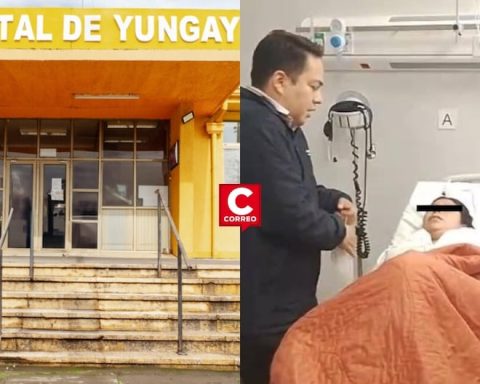
It was comment in both commands. The news that the widow of the dictator Augusto Pinochet, Lucía Hiriart, was declared dead, two days before the elections and hours before the official closing of the campaigns, sat the thinking heads of both sides to see how they came to pass a fact that they had to take charge yes or yes, for better or for worse.
The first thing that was known was about a statement that went viral for the adherents of Approve Dignity, where it was called not to please Pinochetism: “What more would they like (…), than to link our campaign with acts of violence and disorder”. At the same time, and with little room for maneuver, José Antonio Kast had an interview scheduled with the radio conglomerate IARC, where he had no chance of escaping from the issue.
In the case of Kast, the dilemma went through the following: in what way did he take charge of a sector, such as the heart of his Republican Party, Pinochet, being himself a recognized defender of the “work of the military government” – that only the last one he called a dictatorship – and, at the same time, continue with his strategy of trying to convince the more moderate electorate. Finally, and as he did with the deputy Johannes Kaiser and with the lawyer Raúl Meza – who in a report evidenced efforts by Kast himself to pardon the prisoners of Punta Peuco, among them, Miguel Krassnoff -, he moved away from his figure, unaware of any kind of closeness to her and her family.
In that sense, and when asked if he would attend his funeral, the former UDI replied that “it is a private funeral, private funerals are for close relatives. I did not know Mrs. Lucía Hiriart, I am not close to the family ”. Quickly they began to circulate, through the networks, different interviews where he defended the work carried out by the dictatorship, where the ad that said that “if Pinochet were here, he would have a coffee with me at La Moneda” stood out. Or when the mayor of Conchalí wanted to take away the title of illustrious daughter from the former dictator’s widow, and the former deputy himself came out criticizing the decision. Finally, they closed the issue and had no mention in the official campaign closing. What it was understood that, this time, it did not rent.
On the opposite sidewalk, although what was most worrying is that those who came out to demonstrate in the so-called Plaza de la Dignidad would not generate damage and, even less, clashes with Carabineros -so that they could not be used as a counter-campaign-, finally they decided to address the issue on two fronts.
First, through a tweet from the Approve Dignity candidate, minutes after taking the stage located in Plaza Almagro, and stating that “Lucía Hiriart dies with impunity despite the deep pain and division she caused our country. My respects to the victims of the dictatorship of which he was a part. I do not celebrate impunity or death, we work for justice and a dignified life, without falling into provocations or violence ”. But it was not the only thing, his opening in front of those who accompanied him at the end of the campaign was also based on the ex-widow of the dictator, where he adhered to the same script as in the networks. In this way, he spoke to a wide range of his adherents, going from the hardest to the antipinochetist center, which – drawn in political parties – reaches a majority DC.
Close flanks, reinforce forts
Once the covered point of Lucía Hiriart’s death, each one concentrated on seeking, through their speech, to close the flanks that accompanied them throughout their campaign and to reinforce the forts, the pockets of votes they are supposed to have. as a guarantee.
In the case of the candidate of the Christian Social Front, he began his speech by bringing on stage several women who worked side by side in the campaign, such as Paula Daza, Evelyn Matthei, Marcela Sabat, among others. The end, trying to turn the scenario that indicates that the female vote is being taken by Gabriel Boric. This mainly because, in his first government program, he proposed to close the Ministry of Women. In addition, it offered social benefits to women who were married, or the obligation not to abort young women who had been raped. Everything was erased with the elbow in his new government plan and he tried, through the images, to always show himself working with a bracelet in favor of women, or a speech that indicated that this was the candidacy that was going to give them the most opportunities. .
Second, the reinforcement spoke of La Araucanía, their activities in Temuco, and how no one believed they were going to get where they did. It is known that that region has historically been a right-wing voter. At that moment, he repeated the script that he has been developing since the first round, inserting concepts such as violence, communism, order and peace, as well as freedom. That, like each of his interventions, crossed the entire speech.
In the case of Gabriel Boric, women were also pillars at the beginning of his speech, in this case, to reinforce the female vote that several studies have placed in his favor. On the occasion, he indicated that “we cannot accept a candidacy that uses women as a tool to engage in politics in the lowest way (…), a candidate who wants to force a raped woman to be a mother. We tell them no, they will not pass ”, highlighting the feminist movement in this line.
Then, he went to the flank of the pension system, where his advisers have had a speech and the candidate another, without having been able to clarify clearly, throughout the campaign, whether or not the savings will be inheritable. To this is added that, in the last debate, Boric himself backed off from his speech of “no more AFP”, pointing out that people were first and that everyone had to talk, a position that returned to its natural course during his intervention in the closing of the campaign.
Both candidates tried through speech to present themselves to the more moderate voter as a feasible alternative. Thus, in the case of Boric, it was the subject that the “companions and companions” once again left behind – who criticized him so much after his speech after the first round -, referring to the
“compatriots”. In Kast’s case, he attempted to change the perception from a discriminating candidate to one who embodied respect for diversity. This, despite his already recognized statements where he speaks of the “gay dictatorship” or the “gender dictatorship”, or when he questioned La Moneda and Joaquín Lavín himself for giving space to the LGTBI flag, among others.
Both spoke to the former Concertación, in the case of the standard-bearer of Approve Dignidad, with much more ease, since all the parties that made it up gave their support in the second round, regardless of whether the DC indicated that it would be opposition to their eventual government. . In the case of the representative of the Christian Social Front, he greeted the Christian Democrats, mainly the former members expelled from the party after declaring themselves supporters of his candidacy. In Parque Araucano, Zaldívar Palma, son of the former Falangist leader Adolfo Zaldívar, could be seen with the flags of his ex-party.
















